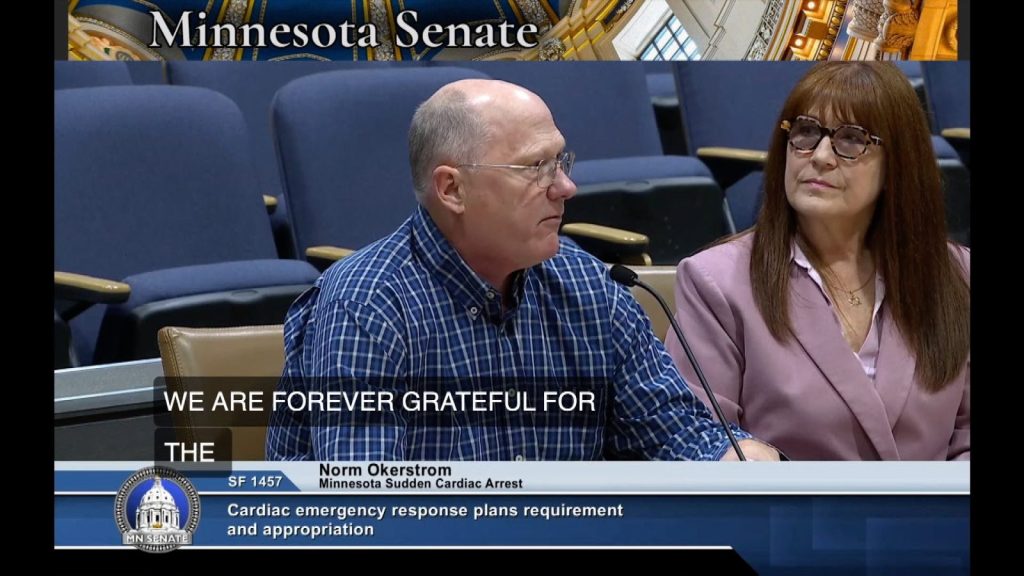Plymouth Senator Proposes Cardiac Emergency Response Bill for Schools
Nationwide, more than 23,000 cardiac arrests happen to children outside the hospital every year. A Plymouth senator wants to boost Minnesota childrens’ chance of survival with a new bill.
The American Heart Association shared on its website that bystander CPR can triple the chance of survival in cardiac arrests. Sen. Bonnie Westlin (DFL-Plymouth) brought a bill to the Minnesota Committee on Education Policy on Monday. It would require school districts to have emergency response plans for cardiac arrests in place by the 2026 school year.
“At the end of the day, this is about keeping our kids safe,” Westlin said. “We hear fairly regularly about young folks who are having these unexpected cardiac emergencies, and sometimes we’ve been lucky enough that the resources or the personnel have been available to save those lives. But we do know that time is of the essence in these situations.”
This plan would require the district to have a designated cardiac emergency response team. Those teams would, as the bill is written, be required to do a simulation 30 days before the school year begins. Coaches would also have to be CPR and automated external defibrillator trained.
The bill would also require schools to make response plans available and accessible both on the school website and in paper form. It proposes offering $3 million to schools to assist and fund these efforts.
Supportive Testimony
A number of people testified in support after Westlin proposed the bill.
Norm and Kim Okerstrom live in Plymouth, and shared a story from summer 2009 when their son, Teddy, was 16.
He was at conditioning for Wayzata football when he suddenly collapsed at practice. His coaches came to his side, administered CPR and used an AED to get his heart pumping. Teddy is still alive today, and now teaches in Denver.
“We are forever grateful for the quick actions that his coaches, alert teammate and staff at Wayzata took to save his life,” said Norm Okerstrom. “It’s these actions, or the unthinkable lack of appropriate actions during a sudden cardiac arrest prior to EMS arrival that make a difference between life and death.”
Okerstrom emphasized that his family is fortunate, but they’re in the minority.
“SCA is the leading cause of death on school campuses. Over the past 15 years, we have gotten to know many, many parents whose child died in very, very similar circumstances,” Okerstrom said. “We’ve seen the pain and anguish as they grieve the loss of their sons and daughters. And we’ve tried to do what we can alongside them to prevent any other parent from losing a child to SCA.”
Mike Schoonover of the Patrick Schoonover Heart Foundation also spoke in support of the bill. He lost his son to SCA when Patrick was just 14. The namesake foundation offers free heart screens and AED donations to schools in need.
Another person who spoke was Kelly Youland from Woodbury, whose young daughter Emma suffered cardiac arrest last spring.
“When a child suffers a sudden cardiac arrest, or SCA, outside the hospital, it’s always unexpected. It can happen on a sunny spring day without any warning– just like it did for Emma,” Youland said. “Emma is lucky enough to have a doctor as a dad, and she is here before you now– meeting all her age appropriate milestones– because CPR was started immediately.”
Next Steps
The committee unanimously recommended the bill to pass. It now goes to the Education Finance Committee.
Westlin said the bill is supported by the American Heart Association, ProjectAdam, the Smart Heart Sports Association, Minnesota Sudden Cardiac Arrest Advocates and the Minnesota Athletic Trainers Association.
Roger Aronson of the Minnesota State High School League told the committee that at MSHSL state tournaments, trainers are always present. Additionally, CPR is required for head coaches entering the practice. Aronson said there is no requirement for maintenance.



